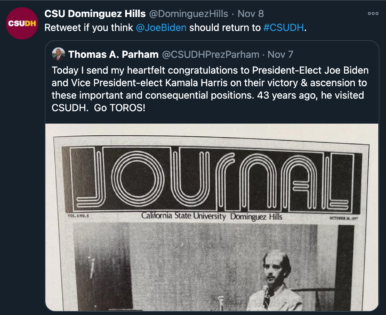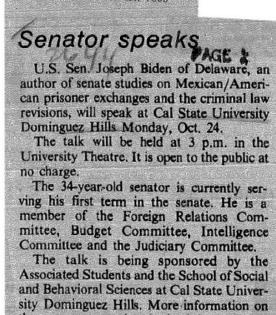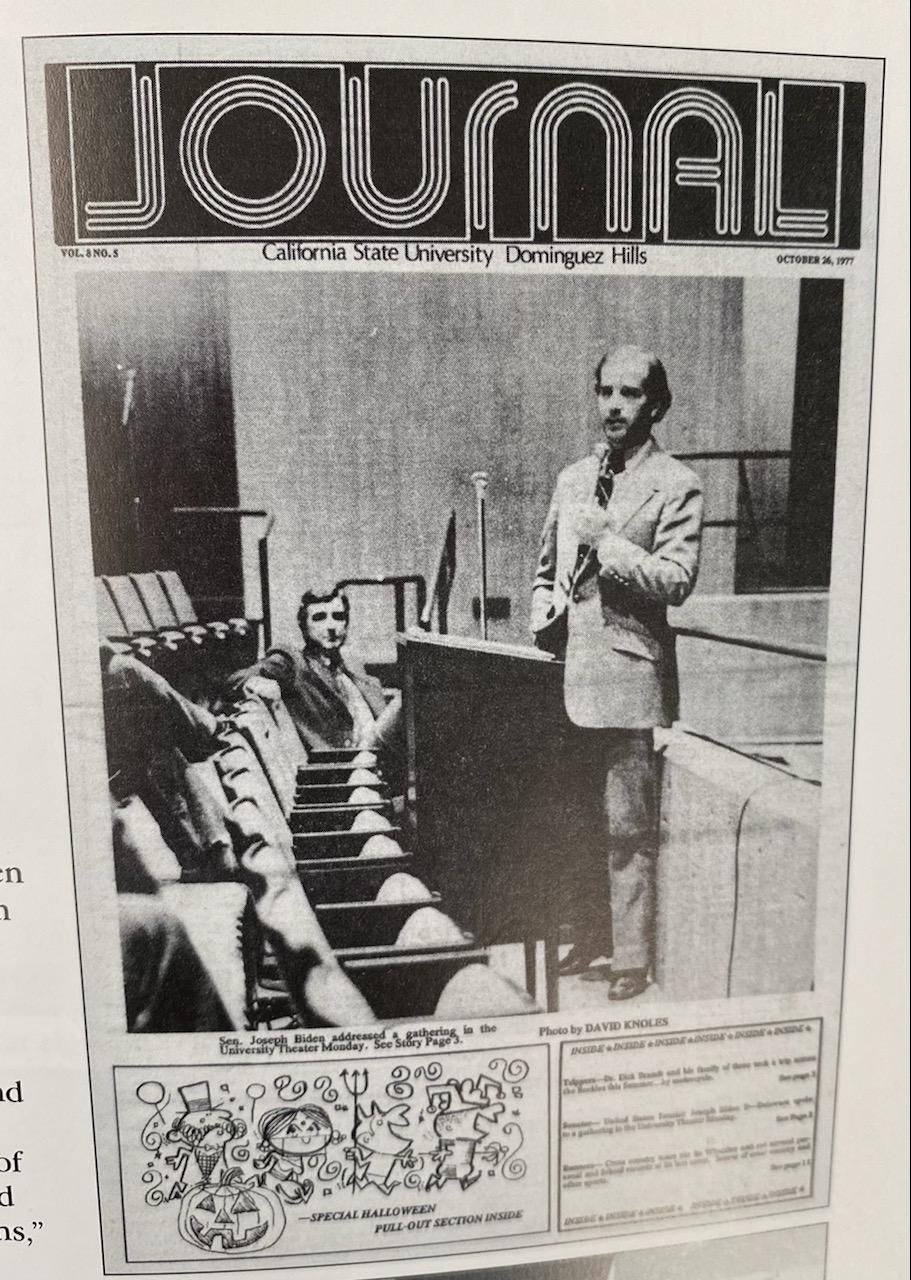President-Elect Joe Biden speaking at CSUDH in 1977, when he was a Delaware senator. You bet we’re claiming him.
By Destiny Jackson, Opinion Editor
The traumatic road to the end of 2020 that we’ve all been marching toward is coming to its ugly conclusion. Finally. Seriously, take a deep breath and read that first sentence again. We’ve got one more month left in 2020, and then just like that, it’s over. And unless President Trump invents a new calendar to add a 13th month or teams up with that ridiculous Space Force department to create a time machine that starts the year over just because he refuses to concede, then there’s nothing he can do to stop 2021 from coming.
Next to “Parasite” winning Best Picture at the Oscars, Disney Plus surprise releasing Beyonce’s “Black is King,” and, I suppose there was the historic World Series win by the Dodgers or Lakers whatever, the 2020 election was just as important on a small list of things that we had left to celebrate culturally as a nation.
After an extraordinarily long week for both MSNBC’s Steve Kornacki, and the rest of the country taking their sweet-ass time counting and reporting ballots (looking at you: Nevada, Arizona, Pennsylvania and Georgia), Joe Biden and Kamala Harris were declared president-elect and vice president-elect respectively.
On a Saturday morning, no less.
And if you’re anything like me, you were anxiously scrolling through your sleep-deprived timeline on social media refreshing for an official declaration before a wave of calm washed over you. But how many of you can say that you also saw a notification from your university president recalling a time that future President Joe Biden visited your school campus some 43 years earlier as a young senator from Delaware? A few of you? OK, well this is a CSUDH newspaper, so leave me alone while I revel in the historic glory.

I did some digging and tried to figure out why President-elect Joe Biden was on our campus and hit a bit of a dead-end. I even asked our college and archives team, but that resulted in nothing but a little blurb in the paper that read:

That’s about all we have letting is know why Biden was on campus at this time. But my research unveiled lots of other fascinating tidbits about what was happening on planet Earth, Milky Way, Known Universe at the time. . The New York Yankees faced off the Dodgers in the World Series, George Lucas debuted “Star Wars,” humble peanut farmer, Jimmy Carter was settling in as our 39th President, and Fleetwood Mac released the iconic album, “Rumours.”
Also at the time of the then- Delaware senator’s arrival to our campus our name changed from California State College, Dominguez Hills to California State University, Dominguez Hills, we had close to 3,000 enrolled students, and Los Angeles County’s 1970s racial demographics were 10.8% Black, 17.5% Latinx, and white 67.9% (this will be important later.)
So, to answer my college’s tweet about whether or not we want Joe Biden to come back and speak on our campus grounds, I decided to write some ideas about potential topics he could lecture about on a future hypothetical visit to our school.
Anti-Desegregation and the relationship with the Black Community going forward
Let’s get the big heavy out of the way. Present-day President-elect Joe Biden still has some kinks to work out in his relationship with the Black community. Black voters saved the 2020 election for the democratic party, those of us in the community haven’t forgotten about his past problematic statements or lackluster efforts. For example, in his 2008 run for President he had this to say about fellow democratic party constituent Barack Obama: “[He’s] the first mainstream African American who is articulate and bright and clean and a nice-looking guy.”
That’s a big bowl of yikeroni, and only furthers the narrative that some white Americans love to eat up in their ideals about Black people as a monolith. One of the main hang-ups to come from Biden’s 1977 term as a senator was his conservative views on using bussing as a way to desegregate schools across the country. To put it simply, Biden wasn’t about it. He didn’t think that states should be forced to integrate schools to bring Black kids into white communities, nor white kids into Black communities, even though it would be proven to vastly improve the lives of the former. This issue was brought up by senator Kamala Harris who was one of the first kids of color to get bussed into her Berkley elementary school as the area was still heavily segregated after Brown v Board of Education. It’s too much for me to discuss in a single paragraph, read more about the President-elect’s views here. Considering that he was touring the country about this anti-bussing policy while supporting desegregating housing with the help of Jimmy Carter, this is probably close to what he was addressing in our campus theater. However, going back to those Los Angeles demographics being majority white, and no breakdown for our college’s racial make-up at the time, I can’t tell whether or not the message fell on deaf white ears or not. It would nice if he came back now some four decades later to our diverse campus to further explain how he will help marginalized people of color in his first 100 days.
White Optimism
Just before the 2020 election at his last town hall, Joe Biden said: “What I will be doing as—if I’m elected president. I’m going to pick up the phone [call] your dad’s old friends on the Republican side. And say, ‘Let’s get together. We’ve got to figure out how we’re going to move forward here.’ Because there are so many things we really do agree on.”
I for one, would love to learn from President-elect Biden who “we” is? I would like to learn up-close and personal about white optimism and how it functions outside of me listening to Coldplay’s “Viva La Vida” or binge-watching Netflix’s “Lucifer” for the one-millionth time. I suppose it shouldn’t be surprising that Biden is not the progressive candidate that young liberals wanted, nor should it be surprising that he has bi-partisan relationships. But to drag the people of color who bore the brunt of harassment and abuse of Donald Trump’s four-year term, nah I don’t think so. However, if Biden was coming to speak, I’d at least try to listen to his plan on getting us to break-bread with conservatives who don’t believe in wearing protective masks, the Green New Deal, or climate change, but favor drawing the line at “well at least they didn’t wear Black face in high school.”
Resilience
What I think Biden is the most apt to lecture about on our campus is his inner strength in the face of so many tragedies and setbacks. Ranging from willingly becoming one of the first white lifegaurds in a newly desegregated neighborhood in 1962 Delaware as white flight took place. The loss of his first wife Neilia and his baby Naomi in 1972 and getting sworn into office at his hospitalized 4-year-old son, Beau’s bedside. His failed first attempt at running for president in 1987 due to plagiarism and academic dishonesty concerns. His subsequent remarriage to Dr. Jill Biden. The loss of his son Beau Biden in 2015 to brain cancer. And then becoming the Vice President of the United States after another unsuccessful Presidential run in 2008. To finally landing being the 46th President of the United States, beating Ronald Regan as the oldest inaugurated and bringing the first biracial, female, Vice President into the White House. This is just a small summary of the extraordinarily fraught life of Biden, and there’s no attempt at humor here when I say that it would be an honor for him to grace our school’s presence to just teach us about getting back up when life knocks you down to your lowest point. As students in the age of the pandemic struggling to stay afloat now and into the future as our world is changing faster than we can adapt a message of hope and perseverance would be key.

